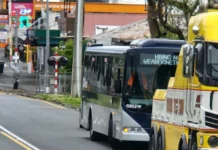Former Minister of Finance Dr ‘Aisake Eke who was one of the witnesses for the convicted Lavulavu couple has pledged to fight to clear his name after the Supreme Court judge said he was not telling the truth.
Dr Eke had given evidence that non government schools were allowed to set their own fee system and that it was acceptable to write a cash receipt of the value of the barter item tendered.
Justice Nicholas Cooper said Dr. Eke provided no proof for his claims and that all his credibility was gone.
“It was obvious he was not desirous of telling the truth.”
Dr Eke also claimed that bartering services or labour for school fees was used world wide.
Under cross-examination by the prosecutor the former Minister of Finance claimed it was perfectly legitimate for the Institute to record a monetary value for the barter in the receipt book.
He said one student had brought a pig as part payment and the value of the pig had been recorded despite it contradicting the pro-forma words on the receipt.
Dr Eke also claimed he “knew of under payments and over payments” but “do not know any institutions that were prosecuted for overpayments.”
He said non-government schools were allowed to set their own fee system and that it was acceptable to write a cash receipt because of the value of the bartered item tendered.
He said during the trial which convicted Cabinet Minister Akosita Lavulavu and her husband ‘Etuate Lavulavu that enrolment figures were manipulated when there were differences between first and second semester.
The couple are set to be sentenced on July 2 after they have plundered more than half a million pa’anga from the government school grant scheme.
Dr Eke said during the trial there had been an assumption that audits were being held annually and that money was only released to the Institute after an audit had been made.
However, government officials were very busy and there was a lack of co-ordination, despite calls for improvements in the process in 2016. Staff conducting audits were told to follow earlier Cabinet decisions.
Dr Eke stands by his claims
His lawyer, Tongan-Auckland based Amelia Schaaf told Kaniva News Dr Eke was subpoenaed by the Lavulavu to appear as a witness in their trial.
Dr Eke said what he provided to the Court was true and he stands by those statements.
“Non-government educational establishments in Tonga are free to formulate their operations and policies and how school fees are paid.
Their school fees can be paid by cash or “in kind”, with Tongan mats or tapa pieces being provided in lieu of cash.
“This reflects the reality of poverty in Tonga as some parents are unable to pay school fees.
“This was the practice at ‘Atenisi and ‘Unuaki ‘o Tonga institutions.
“For government schools, school fees must be paid in cash.
She said the conclusion by Justice Cooper has greatly damaged Dr Eke’s reputation.
“Dr Eke is seeking legal advice whether there is any avenue for him to challenge the damaging conclusion made by Justice Cooper.
“He has worked in various institutions with integrity and has not had his truthfulness questioned. He hopes that people reach their own conclusion about his character, and not on the conclusion by the Judge”.
In kind or barter school fees
As Kaniva News reported, the Lavulavus claimed students did not pay fees in 2013 and 2014 and said they were given the option of making handicrafts or working for the Institute.
“They were able to work in services in buffet dinner services,” Etuate said.
“They were also able to work in tour guiding services. Also do some cleaning up of rubbish at school”
These types of payments were described in court during the trial as barter or payment-in- kind.
Auditor General
Auditor General Sēfita Tangi told the court Cabinet had made no decision to allow these kinds of payments.
“Auditor General made the point that UTRI did not have a record system to prove ‘ in kind’ payment system”.
“Cabinet decision only allows school fees; the reciprocated monetary receipt. Which means pay in cash,” Tangi said.
“This has been procedure probably more than a century for schools in Tonga”.
Payment-in kind or barter had never been accepted.
“Only money was accepted. “







